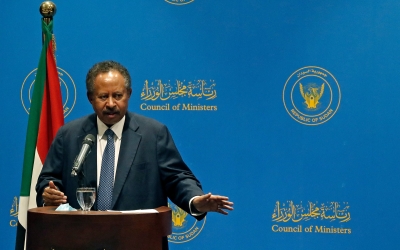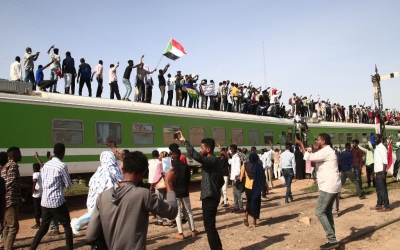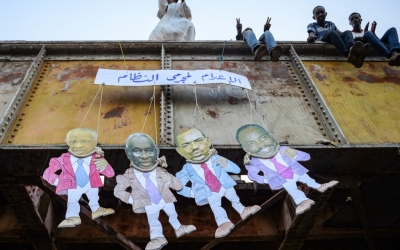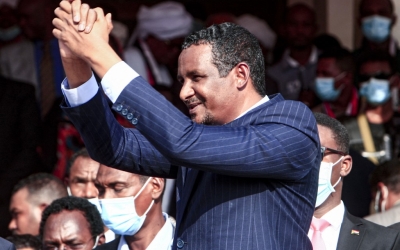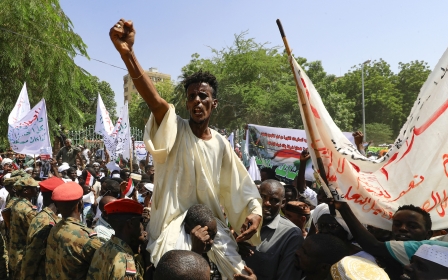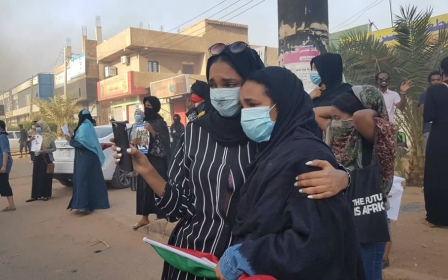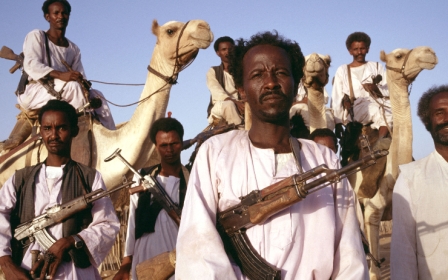Sudan's military and civilian authorities locked in tense power struggle
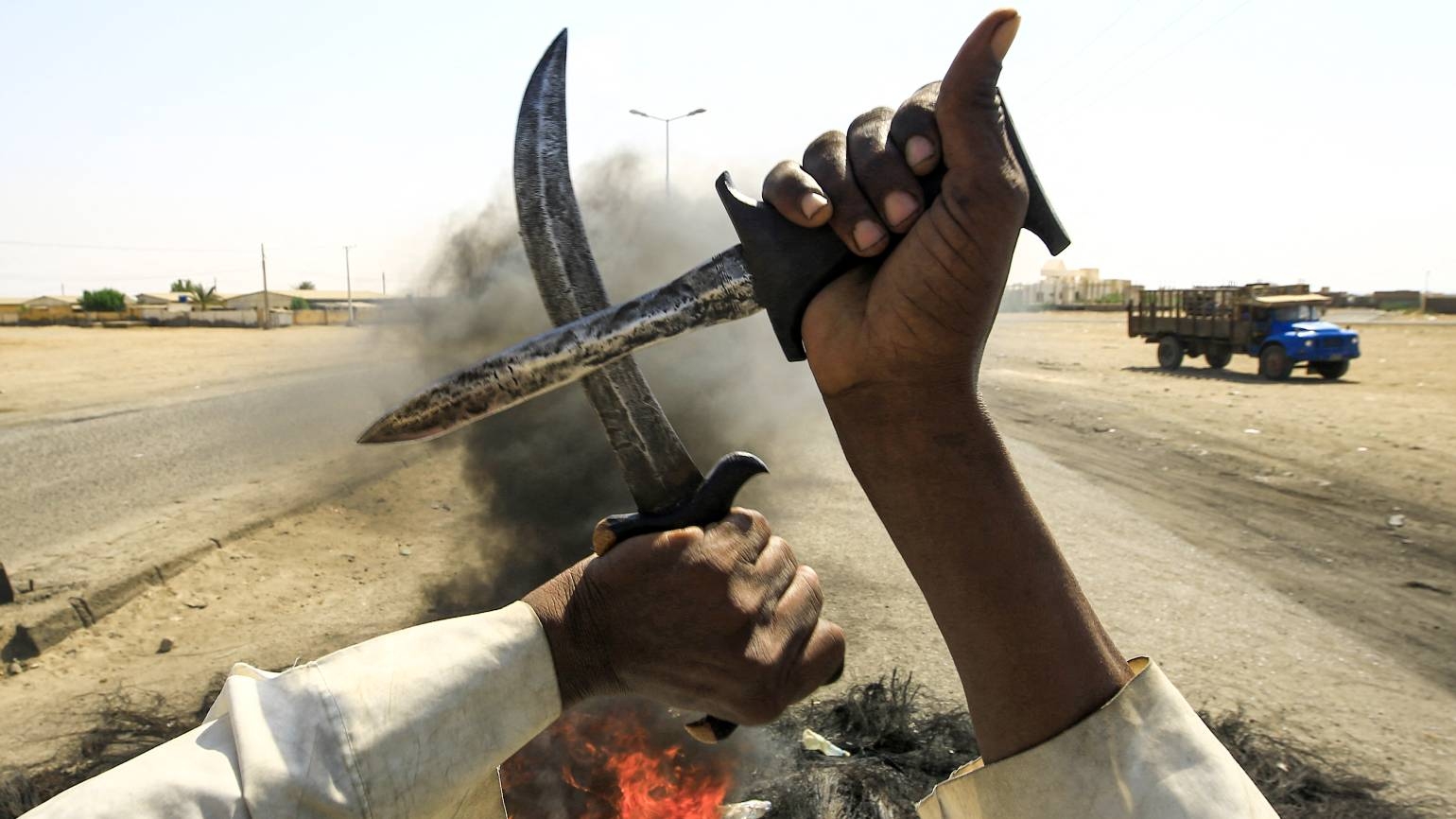
Pro-democracy protesters, analysts and politicians in Sudan are worried the recent rise in tensions between military and civilian factions of the transitional government could lead to a power grab by the army, warning of a scenario similar to the 2013 coup in Egypt some three years since the ousting of autocrat Omar al-Bashir.
The Sudanese army, backed by paramilitary groups, is strongly pushing for a dissolution of the civilian wing of the government headed by Prime Minister Abdalla Hamdok, marking the biggest political crisis in the country’s transition to civilian rule.
'We are willing to die like our brothers who were killed by the same forces that now want to return to power'
- statement by neighbourhood resistance committees
The situation has heated up since Saturday, when thousands of military supporters began a sit-in near the presidential palace, sparking sporadic confrontations between the backers of the army and the civilian authorities amid acute shortages of bread and fuel in the entire country.
Plans for a pro-civilian march on Thursday also raise the possibility of further escalation in coming days, while sources told Middle East Eye that negotiations have already begun to dissolve - or, at least, significantly reshuffle - the current cabinet.
Since August 2019 - four months after Bashir was ousted by a mass protest movement against his nearly 30 years of rule - Sudan has been led by the Transitional Sovereign Council, made up of five civilians chosen by the leading organisations of the anti-Bashir movement, five military representatives, and a chairperson alternating between the two factions.
New MEE newsletter: Jerusalem Dispatch
Sign up to get the latest insights and analysis on Israel-Palestine, alongside Turkey Unpacked and other MEE newsletters
‘Civilians hijacked the revolution’
However, the two branches of government have been at odds from the beginning, and a failed coup in September - blamed on Bashir supporters backed by armed forces - has heightened fears that the military is seeking to undo efforts to bring democracy to Sudan.
The head of the army and current chairman of the Sovereign Council, Abdul Fattah al-Burhan, called last week for the dissolution of the civilian government led by Hamdok, arguing that the move would resolve the current political deadlock in the country.
Meanwhile, the Sovereign Council has been suspended by the military for the last two weeks, and the country’s security services issued a travel ban on a number of civilian officials last week.
Apprehension has only intensified since Saturday, when thousands of former armed militants and supporters of the army first staged a sit-in around the presidential palace in the capital, calling for the immediate dissolution of the civilian cabinet.
The streets of downtown Khartoum near the palace and not far from the Council of Ministers filled with thousands of former members of the Sudan Liberation Movement (SLM/A) rebel group, whose leader Minni Arko Minnawi is also the current governor of Darfur, and of the Justice and Equality Movement (JEM) headed by Finance Minister Jibril Ibrahim.
While the SLM and JEM once fought against Bashir at the height of the conflict in Darfur in the 2000s, the rebels now hold the civilian factions responsible for delays in implementing the Juba peace agreement, signed in 2020 between the transitional government and the country’s many warring factions.
“We won’t leave this square until this government is dissolved,” former Darfuri rebel Ahmed Al-Mukhtar told MEE.
“Those civilians have hijacked the revolution and this is the attitude of a dictatorship in itself. They are saying they are against any potential military coup, but let me tell you that the civilians have committed a coup against the revolution and we are here to address that.”
Civilians strike back
On the other side of the aisle, the current political civilian coalition - composed of the Forces for Freedom and Change (FFC), the Sudanese Professional Association (SPA), resistance committees, unions and other civil society organisations - has called for a “million-man march” on 21 October against the military.
“We will fill these streets to show them our power and our representation of this revolution,” a statement by neighbourhood resistance committees in Khartoum read. “We are willing to die like our brothers who were killed by the same forces that now want to return to power.
“We will show those remnants of the old regime, including the army, how the fight for freedom is rooted amongst our people,” the statement added.
Amid the ongoing power struggle in Khartoum, the army scored another advance as pro-military protesters in eastern Sudan, headed by tribal leader Mohamed al-Amin Tirik, shut down ports and blockaded roads leading to the rest of the country, affecting the supply and distribution of food, bread, fuel and other materials.
Deputy chairman of the Beja Congress political group, Shaiba Dirar, said that the port and road closures would continue until the demands of the ethnic Beja group were addressed, notably the cancellation of the sections of the Juba peace agreement pertaining to eastern Sudan.
“Our demands mainly are against the eastern Sudan track in the Juba peace agreement, because it’s unfair and doesn't represent the real and genuine leaders of eastern Sudan,” Dirar told MEE, arguing that the agreement affected “the security, politics and economy of the entire region”.
Supporters of Hamdok’s cabinet have accused Beja leaders of being manipulated by the army, an allegation that has caused anger among the Bejas.
“Eastern Sudan has very fair demands of equality and a stoppage of the historical marginalisation of our region and people,” Dirar stressed.
“We are very frustrated with the civilians who are leading the country now, this is why we believe that the military component in the transitional government has a great role to play now to protect the country and defend its sovereignty and its national unity.”
Skirting accountability
Western diplomats and sources close to Hamdok have meanwhile disclosed that talks have begun between the two sides to broker a solution to the current crisis.
The sources, who requested anonymity because they were not authorised to talk to the media, revealed that the talks were seeking to negotiate a new power-sharing agreement.
“It may not be a direct dissolution of the government or major changes to the constitutional declaration signed in August 2019, but a kind of wide reshuffle that can grant a larger percentage of the power-sharing quota to the rebels and pro-military supporters,” the sources said.
A Sudanese scholar at an international think tank told MEE they believed Sudan could witness a setback in its transition through a “soft coup” that would allow some former associates of Bashir to take part in the transitional government.
“It may not be a traditional military coup like the Egyptian and Tunisian scenario, but it has a lot of similarities, and in the end it will change the balance of power in favour of the old regime and the military,” the expert, who asked not to be named, predicted.
The academic said many factors were at play in the current power struggle in Sudan - including army generals’ concerns over calls for accountability in the mass killing of protesters on 3 June 2019, as well as their economic and political ties to the former Bashir administration.
Meanwhile, the 2019 constitutional declaration that had paved the way for Burhan to head the Sovereign Council for 21 months meant the general should have handed over the seat to a civilian representative back in May - a transition that has yet to take place.
“We are somehow facing a scenario similar to Bashir’s last years in power, when he wanted to secure a safe exit from being tried by the ICC, so dealing with the military needs some flexibility in terms of opening a narrow door for a way out with some guarantees,” the academic concluded.
Atlantic Council fellow and former US diplomat Cameron Hudson also believes that Sudanese forces are securing means for themselves to evade accountability.
“Is any compromise possible here? The security services must have an exit strategy, they are cornered and fearful of what will happen to them if civilian protesters ultimately get their way,” he told MEE.
“We also know that these leaders are not going to walk willingly into the arms of the ICC or into Kobar prison. They must feel that if they relinquish power they will survive in a future Sudan; this will require trade-offs that could be unpopular.”
Suliman Baldo, a senior researcher for the US-based Enough Project, said that an Egyptian or Tunisian scenario would be unlikely in Sudan, while warning that “current tensions represent a serious risk to the transition”.
“In Sudan, the levels of popular mobilisation have remained very high, and it acts as a deterrent against power grabs by authoritarians,” he told MEE.
“Those opposed to changes in the FFC and within the military are engaged in reckless brinkmanship by encouraging the blockade of Port Sudan and the military's boycotting of Sovereign Council meetings,” Baldo added.
'The only thing keeping the politicians and military remotely honest... is the demands of the vast majority of the population'
- Cameron Hudson, former US diplomat
“State business is thus not being carried out. FFC mainstream factions are also showing recklessness by not agreeing to the expansion of participation.”
Echoing Baldo, Hudson remained confident that the broader Sudanese population - not the military or the politicians - would determine if the revolution continued.
“These current pro-military protests are a smokescreen and an elaborate disinformation campaign,” he said.
“The only thing keeping the politicians and military remotely honest at this stage is the demands of the vast majority of the population, who want to see a new political dispensation in the country.”
Middle East Eye delivers independent and unrivalled coverage and analysis of the Middle East, North Africa and beyond. To learn more about republishing this content and the associated fees, please fill out this form. More about MEE can be found here.


